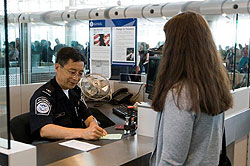 If your absence from the United States has been one year or longer, your green card is no longer valid for reentry. Customs and Border Protection (CBP) officers may not allow you to reenter the U.S. Or, the CBP officer could allow you to enter but also refer you to a judge for deportation proceedings. In fact, under certain circumstances travel abroad could jeopardize your permanent resident status even if your time away has been less than a year. A returning resident visa may be available to some permanent residents with extraordinary situations.
If your absence from the United States has been one year or longer, your green card is no longer valid for reentry. Customs and Border Protection (CBP) officers may not allow you to reenter the U.S. Or, the CBP officer could allow you to enter but also refer you to a judge for deportation proceedings. In fact, under certain circumstances travel abroad could jeopardize your permanent resident status even if your time away has been less than a year. A returning resident visa may be available to some permanent residents with extraordinary situations.
There are a variety of scenarios that could leave you stranded abroad. Here are some potential solutions to your situation.
Temporary Absence Less Than One Year (Lost Green Card)
Permanent residents who lose a green card outside the United States can generally return. But the process will add additional time and expense to the trip. The permanent resident must file Form I-131A, Application for Travel Document (Courier Documentation), at the closest U.S. embassy or consulate. Form I-131A should only be filed if you are returning from overseas travel of:
- Less than one year, and your green card has been lost, stolen or destroyed; or
- Less than two years, and your reentry permit has been lost, stolen or destroyed.
RECOMMENDED: Lost Green Card Abroad and Returning to the U.S.
Temporary Absence More Than One Year
Absences of more than one year, can make things considerably more complex for permanent residents. Even if the permanent resident has a green card, CBP officers will likely ask a series of questions to determine if the absence was temporary in nature. A permanent resident who has been “living” outside the United States will likely be referred to an immigration court for immigration proceedings. This is a serious matter. An immigration judge will decide if you’ve abandoned your permanent resident status.
Generally, this problem can be avoided by obtaining a reentry permit before departing. A reentry permit is valid for reentry to the United States for a period of up to two years after departing.
RECOMMENDED: Green Card Abandonment & Risks of Travel Abroad
Returning Resident Visa
A permanent resident who has remained outside the United States for longer than one year, or beyond the validity period of a reentry permit, will require a new immigrant visa to enter the United States and resume permanent residence. U.S. immigration law provides for the issuance of a returning resident visa (SB-1) to a permanent resident who remained outside the United States due to circumstances beyond his/her control. To qualify for the SB-1 visa, the permanent resident needs to prove that he/she:
- Had the status of a lawful permanent resident at the time of departure from the United States;
- Departed from the United States with the intention of returning and have not abandoned this intention; and
- Is returning to the United States from a temporary visit abroad and, if the stay abroad was protracted, this was caused by reasons beyond his/her control and for which he/she was not responsible.
The success of a returning resident visa application is highly dependent on providing evidence that:
- The permanent resident maintained ties to the United States;
- Permanent resident had an intention to return to the United States; and
- The extended absence was for reasons beyond the control of the permanent resident (e.g. medical incapacitation, employment with a U.S. company, etc.).
For this reason, we recommend that you contact an immigration attorney to evaluate if your situation warrants an SB-1 visa and proving assistance with the application.
Re-apply for Permanent Residence
Fighting for a returning resident visa can be time-consuming and expensive. In many cases, the most practical approach is to apply for permanent residence again. For family-based immigration cases, a relative will need to start the process by filing Form I-130, Petition for Alien Relative. Speak to an immigration lawyer to determine which course makes the most sense for your situation.

